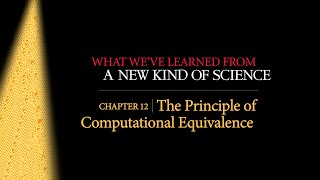
Turing Machines and The Halting Problem (Part 2)
The Halting Problem has fascinated thousands of computer scientists from around the world. A major part of Computing Logic, the proof of the halting problem proves that computers can't do everything. Check out the video to learn more about why computers work the way they do! For Turing Ma
From playlist Math

What does it mean to be Turing Complete? Is HTML & CSS Turing Complete? #shorts #compsci #programming #math
From playlist CS101

Turing Machines & The Halting Problem (Part 1)
In the year 1900, David Hilbert gave a list of 23 mathematics problems for the mathematicians of the new generation. His tenth problem proved to be an enigma for many years until Alan Turing solved it while simultaneously creating the modern computer. Watch the video to see how Alan Turi
From playlist Math

Turing Complete - Computerphile
What does it mean for something to be Turing Complete? Professor Brailsford explains. Turing Machine Primer: https://youtu.be/DILF8usqp7M Turing Machines Explained: https://youtu.be/dNRDvLACg5Q Chomsky Hierarchy: https://youtu.be/224plb3bCog What on Earth is Recursion?: https://youtu.be/
From playlist Subtitled Films

Turing Machines Explained - Computerphile
Turing Machines are the basis of modern computing, but what actually is a Turing Machine? Assistant Professor Mark Jago explains. Turing & The Halting Problem: http://youtu.be/macM_MtS_w4 Busy Beavers: https://youtu.be/CE8UhcyJS0I Avatars & In-Flight VR: http://youtu.be/TLKqKlrQv4s The
From playlist Alan Turing and Enigma

The Turing Test - Computerphile
What was The Imitation Game? It inspired the name for the recent Alan Turing's movie but just what was it? Professor Brailsford explains how Turing may have been having a joke on us. Turing Machines Explained: http://youtu.be/dNRDvLACg5Q How intelligent is AI?: http://youtu.be/hcoa7OMAmR
From playlist Alan Turing and Enigma

Equivalence Relations Definition and Examples
Please Subscribe here, thank you!!! https://goo.gl/JQ8Nys Equivalence Relations Definition and Examples. This video starts by defining a relation, reflexive relation, symmetric relation, transitive relation, and then an equivalence relation. Several examples are given.
From playlist Abstract Algebra

7. Decision Problems for Automata and Grammars
MIT 18.404J Theory of Computation, Fall 2020 Instructor: Michael Sipser View the complete course: https://ocw.mit.edu/18-404JF20 YouTube Playlist: https://www.youtube.com/playlist?list=PLUl4u3cNGP60_JNv2MmK3wkOt9syvfQWY Quickly reviewed last lecture. Showed the decidability of various pro
From playlist MIT 18.404J Theory of Computation, Fall 2020

6. TM Variants, Church-Turing Thesis
MIT 18.404J Theory of Computation, Fall 2020 Instructor: Michael Sipser View the complete course: https://ocw.mit.edu/18-404JF20 YouTube Playlist: https://www.youtube.com/playlist?list=PLUl4u3cNGP60_JNv2MmK3wkOt9syvfQWY Quickly reviewed last lecture. Showed that various TM variants are al
From playlist MIT 18.404J Theory of Computation, Fall 2020

TM Variations: Theory of Computation (Apr 23, 2021)
This is a recording of a live class for Math 3342, Theory of Computation, an undergraduate course for math & computer science majors at Fairfield University, Spring 2021. Download class notes from class website. Class website: http://cstaecker.fairfield.edu/~cstaecker/courses/2021s33
From playlist Math 3342 (Theory of Computation) Spring 2021

Computation Ep32, Turing machines variations (Apr 26, 2022)
This is a recording of a live class for Math 3342, Theory of Computation, an undergraduate course for math and computer science majors at Fairfield University, Spring 2022. The course is about finite automata, Turing machines, and related topics. Homework and handouts at the class websi
From playlist Math 3342 (Theory of Computation) Spring 2022

What We've Learned from NKS Chapter 12: The Principle of Computational Equivalence [Part 1]
In this episode of "What We've Learned from NKS", Stephen Wolfram is counting down to the 20th anniversary of A New Kind of Science with [another] chapter retrospective. If you'd like to contribute to the discussion in future episodes, you can participate through this YouTube channel or th
From playlist Science and Research Livestreams

History of computers - A Timeline
A timeline from the first computer, The Turing Machine, to the 1970's. Hope you guys enjoy,and make sure to subscribe and like! Adding subtitles for our video is welcomed! Your translation can help people around the world see our awesome videos! http://www.youtube.com/timedtext_cs_panel?c
From playlist Computers

Theory of Computation: The Post Correspondence Problem
This video is for my Spring 2020 section of MA 342, for the class meeting on Friday April 24. Fast forward music is from "Now Get Busy" by the Beastie Boys, licensed Creative Commons Noncommercial Sampling Plus.
From playlist Math 342 (Theory of Computation) Spring 2020

Theory of Computation: TM variants
This video is for my Spring 2020 section of MA 342, for the class meeting on Tuesday April 14. Visit the class website for homework as usual! Fast forward music is from "Now Get Busy" by the Beastie Boys, licensed Creative Commons Noncommercial Sampling Plus.
From playlist Math 342 (Theory of Computation) Spring 2020

MIT 18.404J Theory of Computation, Fall 2020 Instructor: Michael Sipser View the complete course: https://ocw.mit.edu/18-404JF20 YouTube Playlist: https://www.youtube.com/playlist?list=PLUl4u3cNGP60_JNv2MmK3wkOt9syvfQWY Quickly reviewed last lecture. Discussed the reducibility method to p
From playlist MIT 18.404J Theory of Computation, Fall 2020

Wolfram Physics Project: Working Session Tuesday, Nov. 2, 2021 [Topos Theory]
This is a Wolfram Physics Project working session about Topos Theory in the Wolfram Model. Originally livestreamed at: https://twitch.tv/stephen_wolfram Stay up-to-date on this project by visiting our website: http://wolfr.am/physics Check out the announcement post: http://wolfr.am/
From playlist Wolfram Physics Project Livestream Archive

Alan Turing: Crash Course Computer Science #15
Today we’re going to take a step back from programming and discuss the person who formulated many of the theoretical concepts that underlie modern computation - the father of computer science himself: Alan Turing. Now normally we try to avoid “Great Man" history in Crash Course because tru
From playlist Computer Science

Maths for Programmers: Sets (The Universe & Complements)
We're busy people who learn to code, then practice by building projects for nonprofits. Learn Full-stack JavaScript, build a portfolio, and get great references with our open source community. Join our community at https://freecodecamp.com Follow us on twitter: https://twitter.com/freecod
From playlist Maths for Programmers
